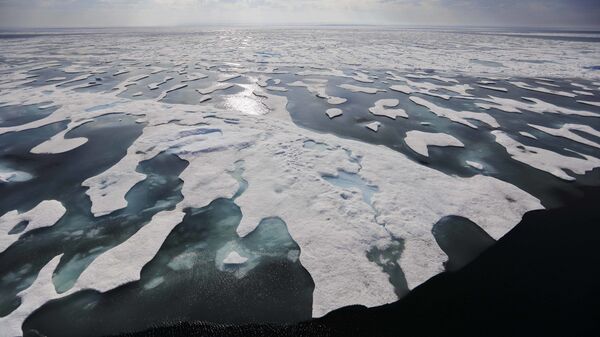Analysing river discharge to ascertain what organic compounds are flowing into the Arctic's shelf seas gives a fairly accurate estimate of how much permafrost has melted. The composition of organic compounds in seawater is also affected by heavy metal salts and organic pollutants coming from household and industrial wastewaters. Therefore, scientists regularly check the quality and quantity of seawater in the offshore zone.
Various physical and chemical methods are used to assess seasonal and spatial changes in the composition of dissolved organics. The fastest and cheapest of these is 3D fluorescence spectroscopy. This works because organic substances glow in ultraviolet light but the nature of the light they emit depends on their structure.
Researchers irradiate the solutions they are studying with unltraviolet light of different wavelengths; the set of frequencies emitted shows what the substance is and their intensity shows how much of it there is. This then makes it possible to determine not only the substance but also its content in water.
Everything in nature is more complex than in the laboratory: seawater contains thousands of organic compounds, and it is impossible to identify everything at once by fluorescence. However, all that is needed is to determine the content of several significant compounds. This is why optical methods are widely used to study seawater.
The most important and complex issue is to establish the smallest number of significant principal components that can be used to decipher the spectrum, according to Timur Labutin, Associate Professor at the Department of Laser Chemistry of Lomonosov Moscow State University.
“Experimental spectra cannot tell us how many compounds were involved in their formation, as the lines of individual spectra overlap. Therefore, modern mathematical methods are used to break down the resulting spectrum into components, in particular PARAFAC (parallel factor analysis). This method based on statistical criteria is excellent for spectrum analysis”, the professor told Sputnik.
The academic added that using more components than there actually are could lead to an error. Formally, the decomposition will be successful, but the programme will produce one of an infinite number of answers that are mathematically correct but incorrectly describe the experimental data.
Various empirical approaches are now being used to assess the “right” number of components that have formed the resulting spectra, allowing an experienced researcher to select the right option.
Staff at the Faculty of Chemistry at Moscow State University (MSU), under the leadership of Labutin, suggested an algorithm for selecting the number of components, which significantly improved the reliability of the result. Ivan Krylov, a postgraduate student from Moscow State University's Department of Laser Chemistry, made a significant contribution to the research as did other students and postgraduates of the department.
The young scientists' development, poetically named “Albatross”, will improve identifying where organic matter in the ocean comes from, which is very important when assessing climate change and environmental monitoring of sea waters. The algorithm was successfully applied in the study of samples collected during an expedition to the shelf seas of the Russian Arctic.
Scientists from the Shirshov Institute of Oceanology of the Russian Academy of Sciences successfully used the Albatross R package to analyse more than 60 samples of water from the Laptev Sea, the Kara Sea, and the coastal waters of Novaya Zemlya during their expedition on the research vessel Akademik Mstislav Keldysh.
Obtaining real-time information on the status of the continental shelf zone is crucial for knowing how to react to natural or man-made disasters, said Natalia Tarasova, a member of the Russian Academy of Sciences and director of the Institute of Chemistry and Problems of Sustainable Development at the DI Mendeleev University of Chemical Technology of Russia.
“It is also crucial to determine the nature of the carbon content in coastal waters associated with changes in river discharges caused by climate change. We hope that the development will be put into serial production soon”, Tarasova told Sputnik.
Scientists from Moscow State University suggest using portable fluorometers for environmental monitoring, which are set up to analyse water in real-time using the Albatross R package. Such a system will enable scientists to clarify the scope of environmental incidents, migration routes of natural and contaminated waters and, if necessary, to identify the source of pollution.
The study results were published in the journal Chemometrics and Intelligent Laboratory Systems.



